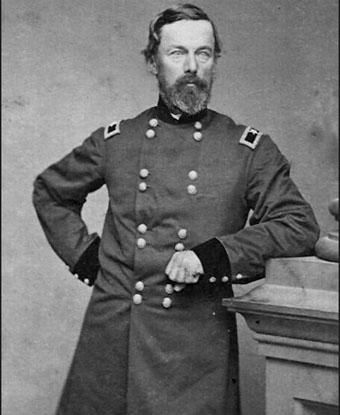Last updated: November 11, 2018
Person
Isaac Peace Rodman

Library of Congress
When the Civil War began, Isaac Peace Rodman was torn between the precepts of his Quaker religion and his loyalty to the Union. Electing to set aside his religious convictions and the leanings of his middle name, he volunteered his services to defend the nation. His initial service proved short, however, when following the Battle of Fort Macon, Rodman contracted typhoid fever and returned home to recover.
When he received a letter from General Burnside informing him of a need for officers for the upcoming movement to counter Lee's invasion of Maryland, Rodman quickly responded. Still ailing and against the advice of his physician, he returned to the Army after only a few weeks, in time to lead the Third Division of the IX Corps in their effort to take Turner's Gap in the Battle of South Mountain.
Three days later, in the Battle of Antietam, on September 17, 1862, Burnside and the IX Corps were ordered to strike the right flank of the Confederate line. When the advance was held up attempting to cross the bridge over Antietam Creek that would bear Burnside's name, Burnside sent Rodman's Third Division further downstream to find a place where they could ford and flank the enemy defending the bridge.
Rodman found too late that no one had properly reconnoitered the proposed ford, two-thirds of a mile south of the bridge, which was unusable due to its steep banks.
It was not until around noon that Rodman's men successfully found and secured the crossing at Snavely's Ford two miles farther downstream. By 1 p.m., Rodman and his men had reached the west bank and had begun to form into line to attack Lee's right, but the delay in organizing the remainder of the corps meant that the benefit of securing the crossing at Snavely's Ford was largely negated.
Rodman led his men in the final assault, only to be turned back by the timely arrival of A.P. Hill's division after a rapid forced march from Harpers Ferry.
Catching sight of the approaching Confederates, Rodman knew his division, on the far left flank, would bear the brunt of their assault and turned to warn his brigade commanders. As he galloped across the field toward them, he was shot through the left lung and fell mortally wounded.
Isaac Peace Rodman died thirteen days later in a field hospital near Sharpsburg, MD.
In a funeral oration, Senator Henry B. Anthony said of Rodman:
"Here lies the true type of the patriot soldier. Born and educated to peaceful pursuits, with no thirst for military distinction, with little taste or predilection for military life, he answered the earliest call of his country, and drew his sword in her defense."
Rodman was one of six generals to be killed or mortally wounded at the Battle of Antietam.
